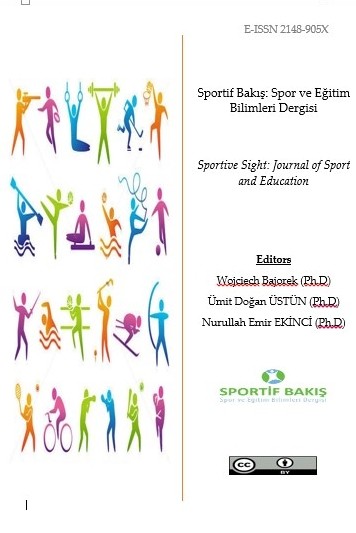BİREYSEL VE TAKIM SPORU İLE İLGİLENEN ÜNİVERSİTE ÖĞRENCİLERİNİN ELEŞTİREL DÜŞÜNCELERİNİN BAZI DEMOGRAFİK DEĞİŞKENLER AÇISINDAN İNCELENMESİ
Bu çalışmanın amacı, bireysel ve takım sporu ile ilgilenen üniversite öğrencilerinin eleştirel
düşüncelerinin bazı demografik değişkenler açısından incelenmesidir. Araştırmaya 116 erkek (%58,0)
ve 84 kadın (%42,0) olmak üzere toplam 200 öğrenci katılmıştır. Araştırmada Kökdemir (2003)
tarafından Türkçeye uyarlaması yapılmış olan California Eleştirel Düşünce Eğilimi Ölçeği (E.D.E.Ö.)
kullanılmıştır. Toplanan verilerin dağılımı incelenmiş ve normal dağıldığı saptanmıştır. Bu nedenle
parametrik test yöntemleriyle istatistiksel analizler yapılmıştır. Araştırma bulgularına göre,
öğrencilerin cinsiyeti, yaşı, spor branşı, tuttuğu takıma bağlılığı, aktif sporculuk durumu ve anne
eğitim durumu ile eleştirel düşünce eğilimi arasında istatistiksel olarak anlamlı bir fark
bulunamamıştır (p>0,05). Baba eğitim durumu ile öğrencilerin eleştirel düşünce eğilimleri arasında
ise, istatistiksel olarak anlamlı bir fark çıkmıştır (F2,981 p=0,03<0,05). Sonuç olarak, öğrencilerin
cinsiyeti, yaşı, spor branşı, tuttuğu takıma bağlılığı, aktif sporculuk durumu ve anne eğitim
durumunun onların eleştirel düşünce eğilimleri açısından anlamlı bir fark yaratmadığı söylenebilir.
Fakat baba eğitim durumuna göre öğrencilerin eleştirel düşünce eğilimleri arasında fark olduğundan
belirleyici bir unsur olduğu düşünülmektedir.
Anahtar Kelimeler:
eleştirel düşünce eğilim, öğrenci, üniversite
EXAMINATION OF CRITICAL THINKINGS OF INDIVIDUAL AND TEAM SPORTS PARTICIPANT UNIVERSITY STUDENTS IN TERMS OF SOME DEMOGRAPHIC VARIABLES
The aim of this study was to examine the critical thinking tendencies of university students
who are interested in individual and team sport in terms of demographic variables. The study was
conducted with 200 students, 116 males (58.0%) and 84 females (42.0%). In the study to collect data
Turkish version of California critical thinking tendency scale was used. The distribution of the
collected data was investigated and normal distribution was determined. For this reason, statistical
analysis was performed with parametric test methods. According to the results of the study, there was
no statistically significant difference on the variable critical thinking tendency according to gender,
age, sports branch, commitment to the team, active sport participation and the mother education
status (p>0.05). However, there was a statistically significant difference according to father education
status (F 2, 981 p=0.033<0.05). As a result, it can be said that gender, age, sports branch, commitment to
the team, active sport participation and mother education status do not make any significant
difference on the variable critical thinking tendency. However, because of there was a significant
difference according to the educational level of the father, it was thought that father education status
is one of the determinants of the students' critical thinking tendencies engaging in individual or team
sports.
Keywords:
critical thinking tendency, university student,
___
- Altunışık, R., Coşkun, R., Bayraktaroğlu, S., & Yıldırım, E. (2007). Sosyal bilimlerde araştırma yöntemleri: SPSS uygulamalı. Sakarya yayıncılık.
- Aybek, B. (2006). Konu ve beceri temelli eleştirel düşünme öğretiminin öğretmen adaylarının eleştirel düşünme eğilimi ve düzeyine etkisi. Yayınlanmamış yüksek lisans tezi. Çukurova Üniversitesi Sosyal Bilimler Enstitüsü, Adana.
- Bahadır, Z., Certel, Z., & Turan, B. (2014). The correlation between critical thinking disposition and internal-external locus of control of candidate students who participated in special talent examination in School of Physical Education and Sports, Ege University. Ovidius University Annals, Series Physical Education and Sport/Science, Movement and Health, 14(2), 332-338.
- Branch, B. J. (2001). The relationship among critical thinking, clinical decision making, and clinical practica: A comparative study.
- Brown, S. (2016). Measures of Shape: Skewness and Kurtosis. Oak Road Systems. Erişim Tarihi: 23.01.2019 https://brownmath.com/stat/shape.htm
- Certel, Z., Çatıkkaş, F., & Yalçınkaya, M. (2011). Beden eğitimi öğretmen adaylarının duygusal zekâ ile eleştirel düşünme eğilimlerinin incelenmesi. Selçuk Üniversitesi Beden Eğitimi Ve Spor Bilim Dergisi, 13(1), 74-81.
- Chaffee, J. (2000). Thinking critically. New York: Houghton Mifflin Company.
- Cheung, C. K., Rudowicz, E., Lang, G., Yue, X. D., & Kwan, A. S. (2001). Critical thinking among university students: Does the family background matter? College Student Journal, 35(4), 577-598.
- Cüceloğlu, D.(1993). İyi düşün doğru karar ver. İstanbul: Sitem Yayıncılık
- Douglas, L., & Connor, R. (2003). Attitudes to service quality–the expectation gap. Nutrition & Food Science, 33(4), 165-172.
- Ennis, R. (1991). Critical thinking: A streamlined conception. Teaching philosophy, 14(1), 5-24.
- Facione, N. C., Facione, P. A., & Sanchez, C. A. (1994). Critical thinking disposition as a measure of competent clinical judgment: The development of the California Critical Thinking Disposition Inventory. Journal of Nursing Education, 33(8), 345-350.
- Başlangıç: 2014
- Yayıncı: Ümit Doğan ÜSTÜN
Sayıdaki Diğer Makaleler
DİJİTAL OYUN OYNAMA TUTUMU ÖLÇEĞİ (DOOTÖ): Geçerlik ve Güvenirlik Çalışması
Gönül TEKKURŞUN DEMİR, Tuğba MUTLU BOZKURT
EĞİTSEL OYUNLARIN ZİHİNSEL ENGELLİ ÇOCUKLARIN ÖFKE DÜZEYLERİNE ETKİSİ
Serkan ZENGİN, Alper Tunga PEKER
Mihri Barış KARAVELİOĞLU, Sait ALTIKAT, Gizem BAŞKAYA, Eda GÖKÇELİK
FUTBOL TARAFTARLIĞI, ÖZDEŞLEŞME VE KİMLİK: TARAFTARLIKTAN FANATİZME...
THE EFFECT OF RECREATIONAL SPORT PARTICIPATION ON ACADEMIC MOTIVATION
Osman GÜMÜŞGÜL, Ceren GÜMÜŞGÜL
